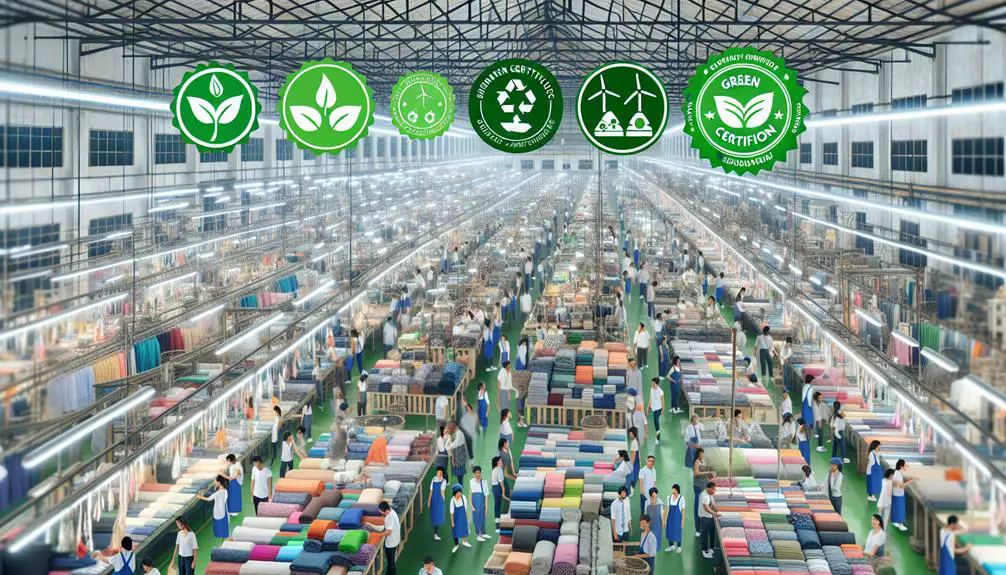You might wonder why certifications in sustainable textiles matter so much. They guarantee that the fabrics you use meet rigorous environmental and social standards, providing transparency and accountability throughout the supply chain. Certifications like GOTS and OEKO-TEX aren't just labels; they're commitments to reducing harmful chemicals and promoting ethical practices. But what exactly do these certifications entail, and how do they influence your purchasing decisions? Let's explore the intricate world of textile certifications and see how they shape a more responsible and sustainable industry.
Table of Contents
Key Takeaways
- Certifications ensure textiles meet stringent environmental and social standards.
- They provide transparency and accountability throughout the entire supply chain.
- Third-party certifications boost consumer confidence in eco-friendly claims.
- Fair labor practices and worker safety are mandated by certifications.
- Advanced technologies like blockchain enhance traceability and compliance.
Importance of Textile Certifications
Textile certifications are necessary because they guarantee products meet specific environmental and social standards. When you're aiming to master the complexities of sustainable textiles, understanding the importance of these certifications is crucial. They play a pivotal role in ensuring that every link in the supply chain adheres to stringent criteria, from raw material sourcing to the final product. This means you can trust that the textiles you choose aren't only high-quality but also ethically produced.
You can't overlook the value of transparency and accountability in this process. Certifications provide a clear framework that holds manufacturers accountable for their practices. They mandate rigorous documentation and regular audits, ensuring that companies maintain the highest standards. This transparency is crucial for you as a consumer or business owner because it lets you make informed decisions.
Moreover, certifications foster a culture of continuous improvement within the industry. By adhering to these standards, companies are compelled to regularly evaluate and enhance their practices. This not only benefits the environment and workers but also elevates the industry's overall quality.
Understanding GOTS Certification
One of the most recognized certifications in sustainable textiles is the Global Organic Textile Standard (GOTS).
When you explore the GOTS certification process, you'll find it covers the entire textile supply chain, from harvesting raw materials to labeling finished products. This guarantees that every step aligns with stringent environmental and social criteria.
The GOTS benefits are numerous. First, it ensures that your textiles are made from at least 70% organic fibers.
You'll also appreciate that GOTS prohibits the use of harmful chemicals, ensuring safer products for consumers and a reduced environmental footprint. Moreover, this certification mandates fair labor practices, which means workers are treated ethically and fairly.
To achieve GOTS certification, you must undergo a thorough evaluation. This includes on-site inspections and annual audits by accredited bodies.
Each stage of production, including spinning, weaving, dyeing, and manufacturing, is scrutinized. Non-compliance at any point can jeopardize the certification, ensuring that only those truly committed to sustainability and ethical practices gain this respected certification.
OEKO-TEX Standards Explained
When exploring sustainable textiles, you'll often come across OEKO-TEX standards, which focus on ensuring products are free from harmful substances. These standards are pivotal for anyone looking to master the intricacies of textile safety. By adhering to OEKO-TEX guidelines, manufacturers can guarantee that their textiles aren't only safe for consumers but also produced through eco-friendly processes.
OEKO-TEX offers various certifications, each targeting different aspects of textile production. The STANDARD 100 by OEKO-TEX is one of the most recognized certifications, ensuring every component of a product, from threads to dyes, has been tested for harmful substances. This meticulous testing process reassures you that the textiles meet stringent human-ecological requirements, safeguarding your health and well-being.
Another vital certification is the MADE IN GREEN by OEKO-TEX, which goes beyond product safety. It emphasizes the importance of environmentally friendly production methods and socially responsible working conditions. When you see this label, you can be confident that the product was manufactured sustainably, with minimal environmental impact.
Fair Trade in Textiles
Fair Trade in textiles guarantees you're supporting ethical production standards and worker welfare initiatives.
You can trust that the products meet stringent criteria for fair wages and safe working conditions.
Ethical Production Standards
Ethical production standards guarantee that textile workers receive fair wages and work in safe conditions. When you prioritize these standards in your textile choices, you contribute to a more equitable and just industry.
Ensuring that every step in the supply chain adheres to ethical guidelines means you're supporting practices that respect both people and the planet. Transparency initiatives are vital here, as they allow you to trace the origins of the textiles, ensuring that every worker involved is treated fairly.
Choosing ethically produced textiles empowers you to make a real difference. Consider the following emotional impacts:
- Fair wages: Workers can provide for their families and improve their quality of life.
- Safe working conditions: Reduced risk of accidents and long-term health issues for workers.
- Environmental protection: Sustainable practices reduce pollution and waste.
- Community support: Ethical production often includes community development programs.
Worker Welfare Initiatives
Worker welfare initiatives, like Fair Trade in textiles, guarantee that workers receive fair compensation and work under humane conditions. By supporting Fair Trade, you're ensuring that laborers aren't exploited and that their rights are prioritized. These initiatives focus on vital aspects like worker safety, ensuring that the environments in which workers operate are free from hazards and comply with stringent health standards.
You'll find that Fair Trade certifications also emphasize supply chain transparency. This means you can trace the entire journey of your textile products, from raw material sourcing to the final stages of production. Such transparency is essential in verifying that every link in the supply chain upholds ethical practices and adheres to Fair Trade principles.
When you choose Fair Trade textiles, you're not just purchasing a product; you're making a statement about the kind of world you want to support. You're advocating for a system where worker welfare is as important as the end product. By demanding worker safety and supply chain transparency, you're helping to build a more equitable and sustainable textile industry, where everyone involved in the process benefits fairly.
Benefits of Organic Cotton
Organic cotton's benefits extend beyond just being eco-friendly; it also offers superior softness and comfort. When you choose organic cotton, you're not only enveloping yourself in a luxurious fabric but also making a tangible impact on the environment. Organic farming practices prioritize soil health, ensuring the earth remains fertile and productive for future generations.
By avoiding synthetic pesticides and fertilizers, organic cotton farming nurtures the ecosystem, enhancing biodiversity and sustaining healthy soils.
Moreover, organic cotton requires significantly less water than conventional cotton. This water conservation is vital in a world where water scarcity is an increasing concern. By opting for organic, you're contributing to a more sustainable future.
Think about the broader implications of your choices:
- Healthier Soil: Protecting and nurturing soil health for better crops and future sustainability.
- Water Savings: Reducing water usage to preserve this significant resource.
- No Harmful Chemicals: Keeping toxic pesticides out of the environment and away from your skin.
- Increased Biodiversity: Supporting diverse ecosystems that thrive without synthetic interference.
Recycled Polyester Credentials
When considering recycled polyester, you need to look at its environmental impact metrics to understand its benefits.
Industry-standard certifications can guide you in identifying genuinely sustainable options. These credentials also play an essential role in building consumer trust in recycled materials.
Environmental Impact Metrics
In evaluating recycled polyester credentials, you need to assess key environmental impact metrics to make informed decisions. Two of the most essential metrics are the carbon footprint and water consumption. By understanding these, you can gauge how sustainable the recycled polyester truly is.
When evaluating the carbon footprint, consider the total greenhouse gas emissions from production to disposal. Recycled polyester typically has a lower carbon footprint than virgin polyester, but the specifics can vary. Make sure you're looking at detailed data that includes emissions from transportation and manufacturing processes.
Water consumption is another vital metric. Producing recycled polyester generally consumes less water than its virgin counterpart, but the exact figures can differ based on the recycling process used. Look for detailed water usage statistics to understand the full environmental impact.
Consider these key points:
- Carbon footprint reductions: Measure the decrease in greenhouse gas emissions.
- Water savings: Quantify the reduction in water usage compared to virgin polyester.
- Energy efficiency: Assess the energy required for recycling processes.
- Waste reduction: Evaluate how much material is diverted from landfills.
Industry Standard Certifications
To confirm your recycled polyester meets sustainability goals, seek industry standard certifications that verify environmental and ethical practices. These certifications guarantee that the materials used in your textiles are truly recycled and produced under conditions that align with global recognition standards.
The Global Recycled Standard (GRS) and the Recycled Claim Standard (RCS) are two prominent certifications. GRS focuses on the entire supply chain, including social and environmental criteria, while RCS confirms the presence and amount of recycled material in a final product. Both certifications are crucial for validating your sustainability efforts.
Here's a quick comparison:
| Certification | Scope | Key Focus |
|---|---|---|
| Global Recycled Standard (GRS) | Entire supply chain | Social, environmental, and chemical practices |
| Recycled Claim Standard (RCS) | Product and material verification | Recycled content validation |
| OEKO-TEX Standard 100 | Product safety and harmful substances | Chemical safety |
| bluesign® | Environmental impact of textile production | Resource productivity |
Consumer Trust Factors
Building on the foundation of trusted certifications, earning consumer trust in recycled polyester hinges on transparent communication and verifiable credentials. You need to make sure that every claim you make about sustainability is backed by concrete evidence.
Trust indicators, such as third-party certifications, are crucial for establishing credibility. By adhering to rigorous sustainability criteria, you demonstrate a commitment to environmental responsibility, which resonates deeply with consumers seeking sustainable choices.
To foster this trust, consider these essential steps:
- Showcase third-party certifications: Certifications like the Global Recycled Standard (GRS) validate your claims and provide a recognized benchmark for quality.
- Provide detailed sourcing information: Transparently outline where your recycled polyester comes from, making sure consumers understand and trust the supply chain.
- Communicate environmental benefits: Highlight the specific sustainability criteria met by your recycled polyester, such as reduced water usage and lower carbon emissions.
- Engage in open dialogue: Encourage consumer questions and feedback, showing that you value their input and are committed to continuous improvement.
How Certifications Impact Consumers
When you see certifications on sustainable textiles, they instantly boost your confidence in the product's eco-friendly claims. These certifications play a pivotal role in shaping consumer behavior. As someone who seeks to make informed purchasing decisions, you rely on these endorsements to verify the authenticity of a brand's sustainability practices. This trust translates into a stronger brand loyalty, as you're more likely to continue supporting brands that consistently meet high environmental standards.
Certifications also streamline your decision-making process. With a clear, standardized indicator of sustainability, you can quickly assess which products meet your ethical criteria. This efficiency not only saves you time but also reinforces your commitment to sustainable living. The presence of these certifications on a product signals a brand's dedication to transparency and integrity, which are qualities you value deeply.
Moreover, certifications provide you with peace of mind, knowing that your purchase contributes positively to the environment. The rigorous standards required for these certifications assure you that you're not just buying into a marketing gimmick. This assurance enhances your overall shopping experience, making you feel more connected to the global movement towards sustainability.
Corporate Responsibility and Certifications
Certifications benefit consumers and compel corporations to adopt more sustainable practices. When your company commits to certifications, it's not just about a green label; it's about embracing supplier transparency and ensuring supply chain traceability. You're holding your brand accountable, making sure every step of your production process aligns with ethical and environmental standards.
By achieving these certifications, you're not only boosting your brand's credibility but also forming crucial industry partnerships that emphasize collective responsibility. You're sending a powerful message to your stakeholders:
- You care about the planet.
- You value ethical labor practices.
- You prioritize quality and authenticity.
- You're a leader in sustainability.
These certifications drive you to scrutinize your supply chain, ensuring every supplier meets rigorous standards. This level of diligence fosters trust and loyalty among your consumers, who increasingly demand transparency.
Additionally, the more transparent your operations, the better you can manage risks and respond to challenges efficiently.
Challenges in Certification Processes
Going through the certification process can be intimidating, with numerous regulations and standards to meet. You've got to navigate a maze of criteria, which often leads to certification delays. These delays can disrupt your production schedule, causing frustration and potential financial strain. It's essential to understand the timelines and prepare adequately, but even the best-laid plans can go awry when dealing with certifying bodies.
Transparency issues also pose significant challenges. When you're aiming for certification, you need clear guidelines and consistent communication from certifiers. Unfortunately, this isn't always the case. You might find yourself in a situation where the criteria seem unclear, or the feedback from auditors is inconsistent. This lack of transparency can hinder your efforts to comply fully with the required standards and can make the entire process feel like you're navigating blindly.
Moreover, the costs associated with certification—both direct and indirect—can be substantial. You're not just paying for the certification itself but potentially for consultants, additional staff training, and process adjustments. If the process isn't transparent and suffers from delays, these costs can escalate quickly, making it essential to approach the certification journey with thorough planning and an adaptable strategy.
Future of Sustainable Textile Certifications
You'll see technology bringing new advancements to textile certifications, making the process more efficient and transparent.
As global standards evolve, staying updated will be essential.
Increased consumer awareness will also pressure companies to adopt more rigorous and credible certifications.
Technology-Driven Certification Advances
Innovative technologies like blockchain and AI are revolutionizing sustainable textile certifications by enhancing transparency and traceability. These advancements in technology innovation are redefining certification criteria, making it easier for you to guarantee the authenticity and sustainability of textiles.
Imagine a world where you can trace every fiber's journey from farm to fabric with impeccable accuracy. Blockchain technology provides an immutable ledger that records each step in the supply chain, while AI helps identify patterns and anomalies, ensuring compliance with stringent certification standards.
Industry collaboration is pivotal in these certification advancements. When manufacturers, brands, and certifying bodies work together, they create robust systems that foster trust and accountability. These partnerships are essential for developing new technologies that meet evolving certification criteria.
Consider the emotional impact of these advancements:
- Peace of Mind: Know that your sustainable choices are genuinely eco-friendly.
- Empowerment: Make informed decisions based on transparent data.
- Accountability: Hold brands and manufacturers responsible for their sustainability claims.
- Innovation: Witness the cutting-edge technologies propelling the textile industry forward.
Evolving Global Standards
Building on the technological advancements driving certification processes, evolving global standards are shaping the future of sustainable textile certifications to guarantee more rigorous and universally accepted criteria.
As you navigate this dynamic landscape, you'll notice that global certification trends are increasingly prioritizing transparency and traceability, validating that every stage of the textile supply chain meets elevated sustainability benchmarks.
You'll find that organizations are now collaborating internationally to harmonize standards, thereby minimizing discrepancies and enhancing credibility. This trend not only simplifies compliance for manufacturers but also empowers you to make informed decisions based on reliable, consistent certification criteria.
To stay ahead, you should keep an eye on emerging frameworks that incorporate cutting-edge technologies such as blockchain for real-time tracking and verification. These advancements are pivotal in establishing a new era of accountability and integrity in sustainable textiles.
Moreover, the integration of social and environmental governance (ESG) metrics into certification schemes reflects a holistic approach to sustainability. By aligning with these evolving global standards, you can verify that your practices not only meet but exceed current sustainability benchmarks, setting a new precedent for future generations.
Embrace these changes, and you'll be at the forefront of a more sustainable and responsible textile industry.
Consumer Awareness Impact
Consumer awareness is reshaping the landscape of sustainable textile certifications, driving demand for transparency and ethical practices in the industry. As a consumer, you're more informed and selective, which profoundly impacts the supply chain. Brands are compelled to adopt verifiable standards, ensuring every step from raw material sourcing to final product is transparent and sustainable.
Your preferences influence marketing strategies. Companies now highlight certifications to differentiate themselves, responding to your demand for ethical products. This shift isn't just about appealing to you but about building long-term trust and loyalty.
Consider how powerful your influence is:
- Empowering Artisans: Your choices support fair wages and safe working conditions.
- Environmental Stewardship: You push for reduced carbon footprints and sustainable farming practices.
- Innovative Solutions: Brands innovate to meet higher standards, from recycling to biodegradable textiles.
- Global Impact: Your demand for transparency holds multinational companies accountable, fostering global change.
As you continue to prioritize sustainability and ethical practices, the future of sustainable textile certifications looks promising. Your role is pivotal in shaping an industry that values both people and the planet. Keep leveraging your power to drive meaningful change.
Frequently Asked Questions
How Do Certifications Affect the Pricing of Sustainable Textiles?
Did you know certified sustainable textiles can be 20-30% more expensive? Certification impact includes stringent standards and traceability, which increase production costs. These pricing factors guarantee you're getting eco-friendly, high-quality products that support ethical practices.
Are There Regional Differences in Textile Certification Standards?
Yes, you'll find regional differences in textile certification standards. A global comparison reveals varying certification criteria, influenced by local environmental regulations. These discrepancies impact the industry, creating challenges and opportunities for international trade and sustainable practices.
What Role Do Governments Play in Textile Certification Processes?
Did you know 70% of textile certifications involve government involvement? You see, governments provide regulatory oversight, ensuring standards are met. Their role is essential in maintaining quality and fostering trust in sustainable textile practices.
How Can Small Businesses Afford Textile Certifications?
You can afford textile certifications by exploring funding options and forming certification partnerships. Address implementation challenges with strategic planning and employ cost-saving strategies like shared resources or phased certification to manage expenses effectively.
Do Textile Certifications Cover Labor Rights and Working Conditions?
You might wonder if textile certifications address labor rights and working conditions. Surprisingly, they often do. Certifications like Fair Trade and ethical sourcing not only consider environmental impact but also guarantee fair practices throughout the supply chain.
- Tetron Fabric for Marine Applications: Durability and Use Cases - June 18, 2025
- Tetron Fabric for Outdoor Furniture: Weather Resistance and Care - June 18, 2025
- Tetron Fabric for Wall Coverings: Style and Application Tips - June 18, 2025





